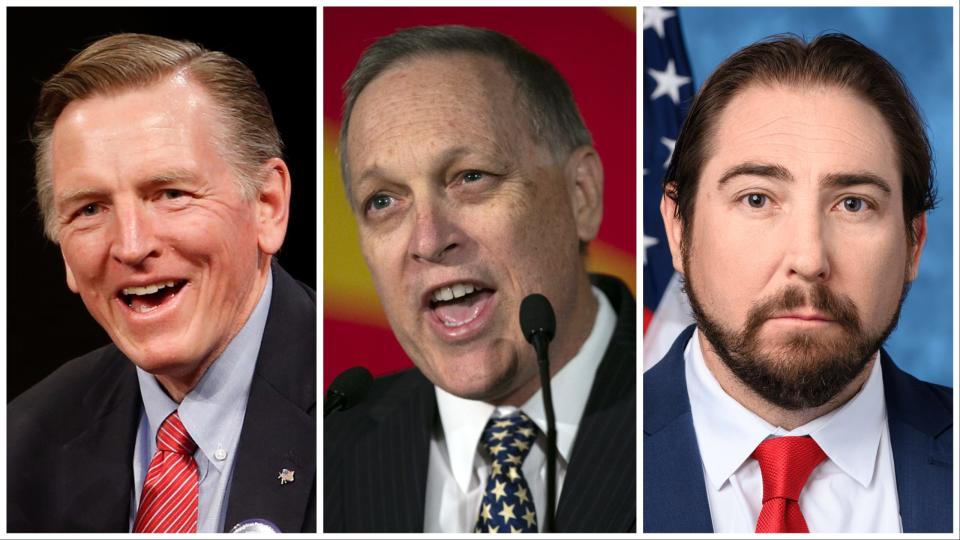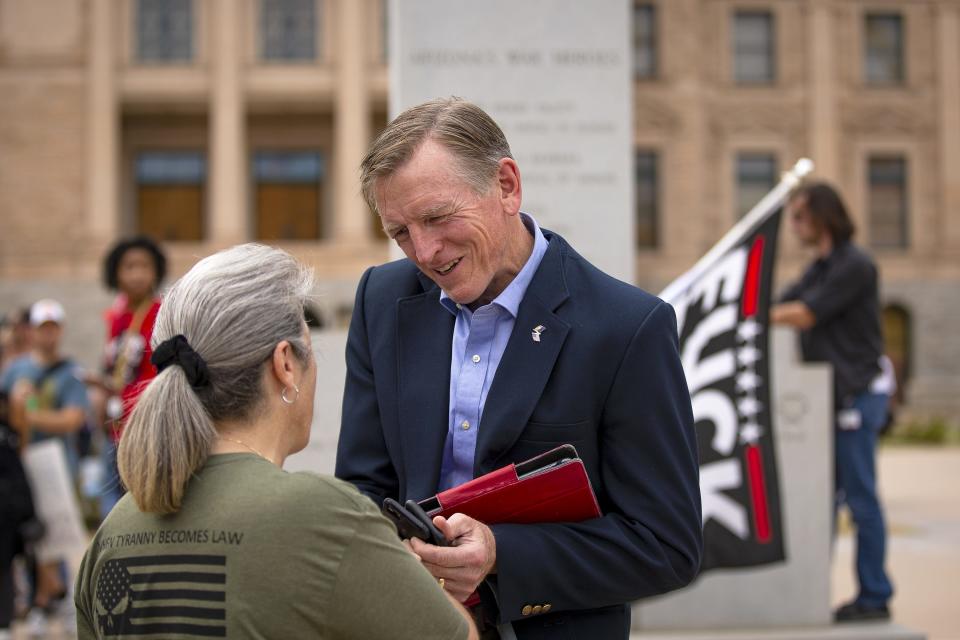''No'-men of Capitol Hill': A closer look at how state’s furthest-right reps do their jobs
- Oops!Something went wrong.Please try again later.
- Oops!Something went wrong.Please try again later.
- Oops!Something went wrong.Please try again later.
- Oops!Something went wrong.Please try again later.
Corrections & Clarifications: Eli Crane took office in January 2023 and did not vote as a House member on the CHIPS and Science Act, the Bipartisan Infrastructure Law and the Inflation Reduction Act. Information was incorrect in a previous version of the article.
John J. Pitney Jr., a politics professor at Claremont McKenna College, has coined a phrase for members of Congress such as U.S. Reps. Andy Biggs, Eli Crane and Paul Gosar of Arizona: They're the “‘no’-men of Capitol Hill.”
Their detractors see them as the “abominable ‘no’-men,” Pitney said.
The three representatives, all members of the House’s highly conservative Freedom Caucus, broadly align with their party in supporting strict measures to curb illegal immigration, wanting to reduce the size and scope of the federal government, and promoting aggressive, though sometimes factually tenuous, inquiries into President Joe Biden and his administration.
In Pitney’s estimation, what sets them apart from other Republicans in Congress is they draw an unusually hard line as negotiators. They say “no” – even if it means throwing Congress off the rails, or accomplishing no deal at all.
“They take chances in hopes of getting everything they want. And those chances involve disrupting the normal business of the House,” Pitney said.
Traditionally, “people give something in order to get something,” he said. ”These folks are operating from different premises. They believe that compromise does not advance their position, and that the only way to achieve their goals is to make it a matter of all-or-nothing.”
Biggs, Crane and Gosar rejected a bipartisan proposal for immigration reform, an issue they describe as a crisis in need of immediate action.
They want to curb U.S. military aid to Ukraine — a push that, if successful, would mark a major shift in U.S. foreign policy.
And Biggs and Crane were among the eight GOP lawmakers who voted to oust Rep. Kevin McCarthy, R-Calif., as House speaker after he compromised with Democrats to stave off a partial U.S. government shutdown – a move that paralyzed the lower chamber for weeks.
The three lawmakers, represent comfortably conservative-leaning districts, defend their strategy as a principled stance against a corrupt D.C. establishment that includes members of their own party.
“The biggest thing lacking from this town is moral courage,” Crane told The Washington Times last year. “There’s a lot of smart people here, but sometimes I think these smart people come here and forget who they actually work for. They don’t work for Republican leadership. They don’t work for this town.”

They describe their colleagues in Congress as members of a "uniparty": shorthand for the Democrats and more moderate Republicans who, in their view, represent the same elite interests.
Some of those moderate Republicans have said the Freedom Caucus contingent is the reason why the current Congress is on track to be one of the least productive in recent history.
“If you look at what we have not been able to accomplish in this Congress, it's predominantly because of Bob Good and his ilk,” Rep. Derrick Van Orden, R-Wis., told CNN in a recent interview, referring to the chairman of the Freedom Caucus.
In concrete terms, many of their tactics have fallen flat. McCarthy’s successor as House Speaker, Rep. Mike Johnson, R-La., ended up making a deal with Democrats on the budget after all. Johnson has signaled he will push for Ukraine aid over those representatives’ objections. And the members’ effort to remove Alejandro Mayorkas, Biden’s Homeland Security secretary, from office has virtually no chance of passing the Democratic-held Senate.
Still, the Freedom Caucus coalition has been successful in pushing policy discussions toward the right and generating visibility on issues they care about, Pitney said.
“They have made themselves a force to be reckoned with. If everybody’s talking about them, if everybody’s cranking the Freedom Caucus into their calculations, that’s a win. They have become a force,” he said.
Voting against money for their districts
Like most House Republicans, Biggs and Gosar voted against the flagship legislation of Biden’s tenure, which has sent large investments toward infrastructure, semiconductor manufacturing and clean energy into their districts.
They've argued the legislation is too expensive or denounced it as misguided "New Deal" handouts that ultimately will harm America's economic interests.
That leaves them in the position of having opposed legislation expected to create a sizable economic stimulus for some of their constituents.
“The conventional wisdom is you get re-elected by bringing goodies home … or doing something concrete for Arizona,” Pitney said. “But that might not be true anymore.”
Those two lawmakers voted against the CHIPS and Science Act, a Biden-led law passed in 2022 that was geared toward reviving manufacturing of semiconductors, components present in many electronics.

Biggs' district, which stretches across much of the East Valley, will be a top beneficiary of the law. Biden recently visited Intel's campus in Chandler to announce a multibillion-dollar CHIPS Act grant which, by itself, is expected to send billions of dollars and create thousands of jobs into the local economy.
Biggs' statements on the issue are scarce, though he has criticized the Biden administration in general for spending too much money.
Biggs and Gosar also voted against the 2021 Bipartisan Infrastructure Law, which the White House estimates has sent more than $7 billion to Arizona as of February. Most of that will go toward roads, bridges, and highways across the state, with additional funding to build out access to high-speed Internet and public transit.
The law has sent a bevy of funds across the state, including in Crane's district, which encompasses most of northeastern Arizona. The law will fund transportation and pedestrian infrastructure upgrades in Flagstaff; it affirms the Navajo Nation's water rights claims and helps fund water supply projects in the Gila River Indian Community; and cleans up a contaminated abandoned mining site in Dewey-Humboldt in Yavapai County.
That law was passed before Crane took office, though he has responded to Biden's record on infrastructure by pointing to statistics showing that Americans' cost of living has risen steeply over the past three years.
Biggs and Gosar also voted against the Inflation Reduction Act, the climate-focused law that creates incentives for technologies that could help the U.S. lower its carbon emissions.

A $200 million cobalt production facility, a key part of the electric vehicle supply chain, is coming to Gosar's district, which stretches from the West Valley south to Yuma and north to the borders of Nevada and Utah. The company behind the project has said that Biden's climate law made that investment possible.
Gosar said he voted against the law because it would raise taxes.
Likewise, the battery company LG Energy Solution is investing $5.5 billion to build a battery manufacturing complex in Biggs' district. That's "the largest single investment ever for a stand-alone battery manufacturing facility in North America," and will create thousands of jobs, according to the Arizona Commerce Authority.
Explaining his vote at the time, Biggs argued that the climate law would add to inflation and make a recession more likely. He added that the bill's measures to hire more federal tax agents and auditors are an attempt to "abuse the power of government" and "go after the American public."
"It's filled with Green New Deal programs to give money to Green New Deal corporations that are the beneficiaries and favorites of the Democrats," Biggs said of the law.
Expert: By some metrics, they're as effective as their peers
Are those three lawmakers good at governing? That’s a more complicated question than it might seem, said Craig Volden, a University of Virginia professor who studies effective lawmaking.
At an individual level, Volden and his colleagues’ data suggests that those three lawmakers are about as “effective” as their peers.
Their algorithm measures lawmakers’ effectiveness based on formal steps they’ve taken to introduce, advance and pass legislation. It doesn’t account for some of the more controversial actions that Biggs, Gosar, and Crane have taken outside the legislative process, such as their votes to oust McCarthy, public statements that shape the negotiating process or damage to the network of relationships on Capitol Hill that keep Congress’ gears turning.
According to their algorithm, Biggs and Gosar both met expectations during the previous session of Congress. Gosar has exceeded expectations during three of the six terms he has completed in Congress. Both lawmakers outranked former Rep. Ann Kirkpatrick, D-Ariz., and the outgoing Rep. Debbie Lesko, R-Ariz., who fell below expectations during the 2021-22 session. Biggs was considered more effective than Rep. David Schweikert, R-Ariz., during that time as well.
The algorithm hasn’t officially scored Crane, a freshman member who has not yet served a full term. But so far, he’s on track to meet expectations, Volden said.
That contrasts with those lawmakers’ incendiary public images, which have involved associating with groups who overtly embrace white supremacy and fanning the flames of the effort to undermine the result of the 2020 presidential election.
“Perhaps he doesn’t want to advertise working with Democrats on some of these issues. I don’t know,” Volden said of Gosar. “But the patterns are there.”
“Although he tends to vote with the right of his party, he’s had bipartisan co-sponsors on a lot of his pieces of legislation. … He’s had a lot of them receiving action in committee, many of them passing the House,” he said. “It runs counter to a narrative, but it’s really what we can back up with evidence.”
Reached for comment, Anthony Foti, a spokesperson for Gosar, wrote in a statement that the congressman has a “long and proven record of accomplishments” and “is extremely effective even in times of gridlock.” Foti pointed to a resolution Gosar introduced to formally end the COVID-19 national emergency, which easily made it through Congress with bipartisan support and eventually became law.
“The left fears Congressman Gosar because he is not another rubber stamp on their woke and radical agenda. Instead, Gosar works tirelessly for all Arizonans and the American people,” Foti wrote.
Volden believes the data on Biggs is instructive. By his accounting, the former Arizona lawmaker was highly effective while he served in the state legislature, sponsoring an average of 15 bills each term that became law. That changed when he arrived in Congress, where he is meeting benchmarks, according to the data, not exceeding them as he once did.
“He has, as exhibited in Arizona, the skill set to be an effective lawmaker, and the interests to be an effective lawmaker. In Congress, it feels like maybe he’s pulled in multiple directions,” Volden said.
In 2023 alone, Biggs introduced 590 bills, far more than any other member of Congress.
That’s “clearly symbolic, but clearly also signaling, ‘Here’s what my caucus stands for.’ The intention of those was, I don’t believe, to get all of them individually adopted into law, but to set the goalposts,” Volden continued.
Reached for comment, Biggs' office pointed to his work to reform a controversial spy program as an example of his bipartisan work. Biggs' effort on that topic has garnered support from progressives and MAGA Republicans alike.
Aides to Crane did not respond to multiple requests for comment.
Their hard-line opposition to the Democrats can be popular in a political climate where voters’ views are increasingly defined by their hatred for the opposing party, Pitney said. But that could have limits: Voters may cease rewarding political parties if they believe parties make Capitol Hill dysfunctional.
One election could test that thesis. Crane, the only freshman member of Congress who participated in the ouster of McCarthy, faces a primary challenge from a former Yavapai County supervisor Jack Smith amid reports that McCarthy’s allies were recruiting someone to challenge Crane.
Smith criticized Crane's governing style in a statement to The Arizona Republic.
"One of the most important duties of a member of Congress is to be an advocate for your constituents. Eli Crane made the selfish decision to put his own interests above his constituents," Smith wrote. "I'm running for Congress because rural Arizona needs a real conservative who fights for the people of Arizona's 2nd Congressional District."
Laura Gersony covers national politics for the Arizona Republic. Contact her at lgersony@gannett.com or 480-372-0389.
This article originally appeared on Arizona Republic: Arizona hard-liners Biggs, Crane, Gosar: ''No'-men of Capitol Hill'

